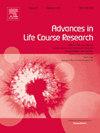Contrasting destinations? Emerging intention trajectories of latent family size
IF 3.4
2区 社会学
Q1 Medicine
引用次数: 0
Abstract
Although fertility levels in European countries, including Hungary, have long been well below the two children per woman required for reproduction, the two-child family ideal has dominated views about the ideal number of children for decades. Our aim was to identify potential alternative trajectories regarding the intended number of children, specifically deliberate childlessness or a preference for large families. Using group-based trajectory analysis, we explored trajectories and several demographic, socioeconomic and attitudinal characteristics associated with them using a subsample of people aged 18–33 from five waves (2001–2016) of the Hungarian Generations and Genders Survey. Our findings reveal that among young people without children at age 18–33, approximately one in ten follow a trajectory of deliberate childlessness, with over a quarter of 18–33-year-olds are on a trajectory towards a large family. The associated criteria largely align with our expectations: age, partnership status, socialisation, educational attainment and support for career orientation significantly influence trajectory selection. However, some unexpected effects emerged, particularly with regard to the effect of education in the case of the voluntary childlessness trajectory.
对比目的地吗?潜在家庭规模的新意向轨迹
尽管包括匈牙利在内的欧洲国家的生育率长期以来远低于每个妇女生育所需的两个孩子,但几十年来,两个孩子的家庭理想一直主导着人们对理想孩子数量的看法。我们的目的是确定关于预期子女数量的潜在替代轨迹,特别是故意不生育或偏爱大家庭。使用基于群体的轨迹分析,我们使用匈牙利世代和性别调查五波(2001-2016)中18-33岁人群的子样本,探索了轨迹以及与之相关的几种人口统计学、社会经济和态度特征。我们的研究结果显示,在18-33岁没有孩子的年轻人中,大约十分之一的人遵循故意不生育的轨迹,超过四分之一的18-33岁的人正朝着一个大家庭的方向发展。相关标准与我们的预期基本一致:年龄、伴侣关系、社交、教育程度和对职业方向的支持显著影响轨迹选择。然而,出现了一些意想不到的影响,特别是关于教育对自愿无子女轨迹的影响。
本文章由计算机程序翻译,如有差异,请以英文原文为准。
求助全文
约1分钟内获得全文
求助全文
来源期刊

Advances in Life Course Research
SOCIAL SCIENCES, INTERDISCIPLINARY-
CiteScore
6.10
自引率
2.90%
发文量
41
期刊介绍:
Advances in Life Course Research publishes articles dealing with various aspects of the human life course. Seeing life course research as an essentially interdisciplinary field of study, it invites and welcomes contributions from anthropology, biosocial science, demography, epidemiology and statistics, gerontology, economics, management and organisation science, policy studies, psychology, research methodology and sociology. Original empirical analyses, theoretical contributions, methodological studies and reviews accessible to a broad set of readers are welcome.
 求助内容:
求助内容: 应助结果提醒方式:
应助结果提醒方式:


